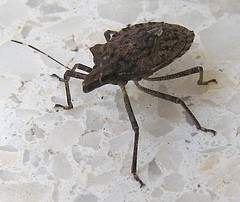
flickr.com/haynes
Have you ever awaken to find itchy bites on parts of your body? You might have imagined that a mosquito found its way into your room, but you may have been visited by another, more treacherous pest.
Bed bugs are seen around the world, and any home can be at risk of an infestation. When bed bugs come to visit, they’ll settle in to a dark corner and reproduce until an army can contain literally hundreds of these tiny bloodsuckers.
Several years ago, bed bugs were most prevalent among birds’ nests. However, over the years, bed bugs evolved and adapted to environmental changes. They eventually learned to leave the nest and settle into the homes of much larger warm-blooded victim: humans.
Bed bugs are a bit intelligent, as far as insects are concerned. They can be extremely smart in the manner that they live and feed. Bed bugs suck the blood of their human hosts, and may also target animal prey including cats, dogs, birds and even bats.
When a bed bug locates a human home to live in, it will never be lacking for food. Bed bugs attack their sumptuous meals by using their elongated beaks to pierce the hosts’ skin. The feast starts, and the insects will feed on blood until they are literally engorged. While people and other animals may struggle to look for food, a bed bug living in a human home will never run out of supplies.
Disease from Bed Bugs
Medical experts and doctors have asserted that the bites of bed bugs do not present any particular danger of disease. Mosquito bites are far more threatening because they can sometimes transfer serious ailments such as malaria, elephantiasis, dysentery, elephantiasis or h-fever.
A bed bug can be a host to a number of diseases, but they are seldom able to pass these conditions on to their victims or hosts. There is a greater danger of acquiring an infection from constantly and harshly scratching at the itchy, affected areas.
How Do Bed Bugs Bite
As earlier mentioned, bed bugs use their beaks to pierce the skin and suck an abundant supply of blood. In doing so, they will leave a small amount of their saliva in the victim’s skin. Fortunately, this saliva does not contain diseases or pathogens. However, they can cause allergic reactions. Some individuals with sensitive skin will react harshly to these bites.
Mostly, bed bug bites swell after 10 minutes to 24 hours. They swell and appear reddish, similar to mosquito bites. There is usually itchiness and discomfort that accompanies the swelling. Remember when your mother warned you “Scratching it will only make it worse”? Of course, she was right. The itch from bed bug bites can be so persistent that victims continue on scratching, making the condition even more annoying. In the end, the aggravating bite marks will become real wounds that are prone to infection.
Simply avoid the Bite
Of course, the best and most effective manner to prevent or avoid the bites of bed bugs is to ensure the insects will not appear after the sun goes down.
The first step to enjoying a bug-free sleep is to ensure that your bed, and your entire room, is not infested by bed bugs. Maintain cleanliness and hygiene to prevent bed bugs from settling in. Clean your room regularly and thoroughly, paying close attention to cleaning crevices and cracks in your walls and floors.
If you’re a traveler, be sure the hotel you’re staying in is not infested with bed bugs. If bed bugs are present in your hotel room, they will sneak into your baggage and begin a new infestation when you arrive at home.
When traveling, consider putting on an insect repellant to your skin before you go to sleep. There are lotions and easy-to-use sprays that will make bed bugs reluctant to go near you. They’ll look at your skin as a danger zone, and will find you an unappealing source of food.
To recap, here are some data to remember about bed bugs:
* If you travel or share a home with others, it can be difficult to avoid the reality of bed bugs.
* Once a few of these insects have found their way into your home, they can swiftly multiply until you’re forced to deal with a full infestation.
* Prevention is always better than a cure. Keep your home tidy and don’t put yourself in the position of importing bed bugs by staying in hotels or using second hand furniture.
* Put on an insect repellant on your skin when sleeping in a hotel room. This will ensure to send the bugs packing.
* If you are bitten by bed bugs, remember, don’t panic. These pests will not spread disease. Quickly wash the area with soap and water, and treat it as you would a mosquito bite. In a few days, the bite marks will disappear and heal themselves.
Bed bug bites are less risky than mosquito bites, but infinitely creepier. Should you fall prey to bed bugs in your home, your best course of action is to call a professional exterminator.
Tagged with: bed bugs control • pests control
Filed under: Bed Bugs